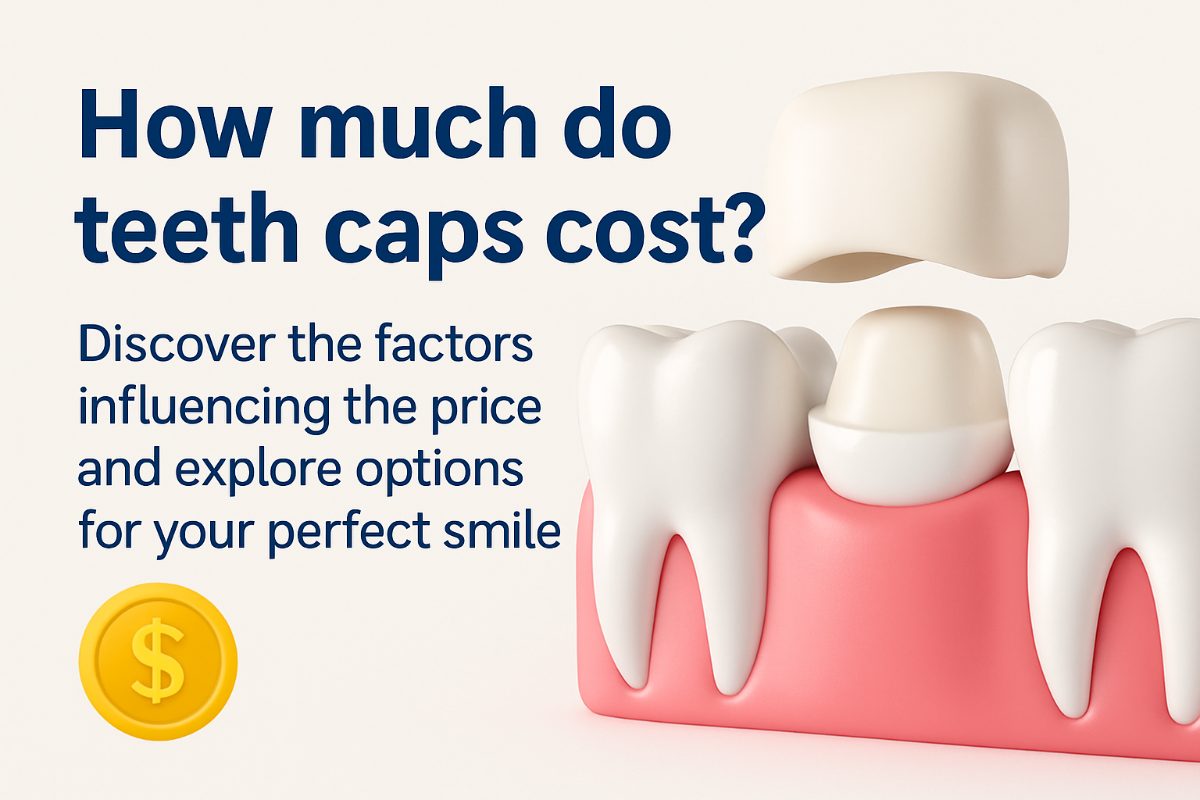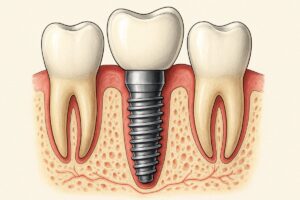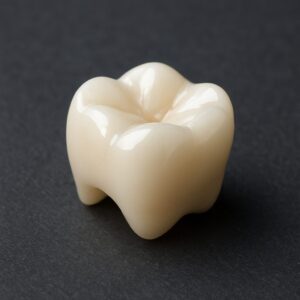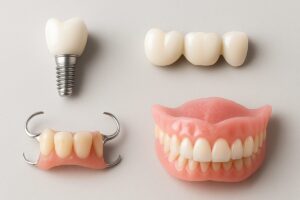Many patients ask, ” how much is teeth caps?” This guide answers that question in plain language. You’ll learn what dental crowns (teeth caps) do, what affects their price, typical cost ranges, payment options, and how to pick the right crown and dentist. If you live near Panhandle, TX, this will help you prepare for a consult and get a clear estimate.
What Are Teeth Caps (Dental Crowns)?
Teeth caps, also called dental crowns, are custom-made covers that fit over a damaged or weakened tooth. Their main goals are to protect the tooth, restore its shape and size, and improve how it looks. Crowns can save teeth that have big fillings, cracks, or have had a root canal. They’re also used for cosmetic changes and to cap dental implants.
Common crown materials include:
- Porcelain-fused-to-metal (PFM) — strong with good color match
- All-ceramic (porcelain) — best for front teeth and appearance
- Zirconia — very strong and durable, good for back teeth
- Gold or metal alloys — long-lasting, minimal wear to opposing teeth
- Temporary/resin crowns — short-term while the final crown is made
Dentists typically recommend a crown for a tooth with a large filling, a crack, after root canal therapy, or when the tooth needs a better cosmetic appearance.
Factors That Affect How Much Is Teeth Caps
Several things change the final price of a crown. Understanding them helps you compare estimates.
Material choice
The material is one of the biggest cost drivers. Resin and temporary crowns are the cheapest. PFM crowns are mid-range. All-ceramic and zirconia are higher-cost choices because of aesthetics and strength. Gold or high-noble metal crowns can also be pricier depending on metal market value.
Tooth location & complexity
Back teeth (molars) take more stress and sometimes need stronger materials, which can raise cost. Front teeth need better color matching and fine shaping, also increasing lab work and price. Complex tooth prep (deep decay, unusual shape) can add time and cost.
Pre-treatment needs
Additional treatments like root canal therapy, post/core buildup, extractions, gum reshaping, or bone grafts add to the total cost. The crown price alone may not include these procedures.
Lab vs same-day digital crowns
Traditional lab-made crowns involve lab fees and several visits. Same-day crowns made with CAD/CAM systems can be more convenient and sometimes more costly up front, though they may save time and reduce temporary crown needs.
Provider experience & technology
Specialists or dentists with advanced training may charge more. Practices that use digital scanners, CBCT imaging, in-house milling, or premium labs may have higher fees but offer tighter fit and faster service.
How Much Is Teeth Caps: Average Cost Ranges and What They Include
Below are ballpark cost ranges by material. These are general estimates and can vary by practice and region.
- Temporary/resin crowns: $100–$500
- Porcelain-fused-to-metal (PFM): $500–$1,200
- All-ceramic (porcelain): $800–$2,000
- Zirconia crowns: $900–$2,500
- Gold or high-noble metal crowns: $800–$2,000+
Typical quoted price for a crown often includes the tooth preparation visit, a temporary crown, the lab fabrication of the final crown, and an adjustment visit. Extra items that may be billed separately include X-rays, root canal treatment, post/core, gum reshaping, extra visits, and sedation.
Insurance note: Many dental plans cover a portion of crown costs, often after a waiting period and subject to annual maximums and coinsurance. Cosmetic-only crowns may not be covered. Always get a pre-treatment estimate from your insurer.
How To Pay For Dental Crowns
Common payment options include:
- Dental insurance — check covered services, deductibles, and annual limits
- Financing plans like CareCredit — spread payments over time
- In-house payment plans or monthly billing from the dental office
- Dental membership or discount plans offered by some practices
- FSA/HSA funds or credit cards for out-of-pocket costs
To lower costs responsibly, ask about material alternatives, phase treatment across years to use insurance benefits, or compare quotes from multiple dentists. Don’t choose the cheapest option without confirming quality and warranty.
How To Choose The Right Crown and Dentist
Ask these questions before you commit:
- What materials do you recommend for my tooth and why?
- Who makes the crown — an outside lab or in-house milling?
- What is the expected lifespan and warranty for this crown?
- How do you match shade and shape for natural appearance?
- Can I see before-and-after photos of similar cases?
Look for technology and quality signs: digital impressions (high-resolution scanners), in-house milling or 3D printing for same-day crowns, CBCT for complex planning, and clear, written treatment plans with itemized costs and payment options.
Why Consider HAR Dental Group and Dr. Omar Harmouche for Crowns
HAR Dental Group, led by Dr. Omar Harmouche, DMD, offers advanced restorative care with technology that improves crown fit and predictability. Dr. Harmouche is a Tufts-trained, nationally recognized implant and restorative dentist who focuses on full-mouth restorations and patient comfort.
Technology that supports better crown outcomes at HAR Dental Group includes Primescan intraoral scanners for accurate digital impressions, Primeprint 3D printing and in-house milling for fast custom restorations, CBCT imaging for precise planning, X-Nav guided workflows for surgical accuracy, and same-day crown capabilities when appropriate.
During a consultation, patients can expect a personalized estimate, a discussion of material options and expected longevity, and clear payment or financing choices. To learn “how much is teeth caps” for your specific case, schedule a crown consult — you’ll get a tailored plan and written cost breakdown to make an informed decision.






